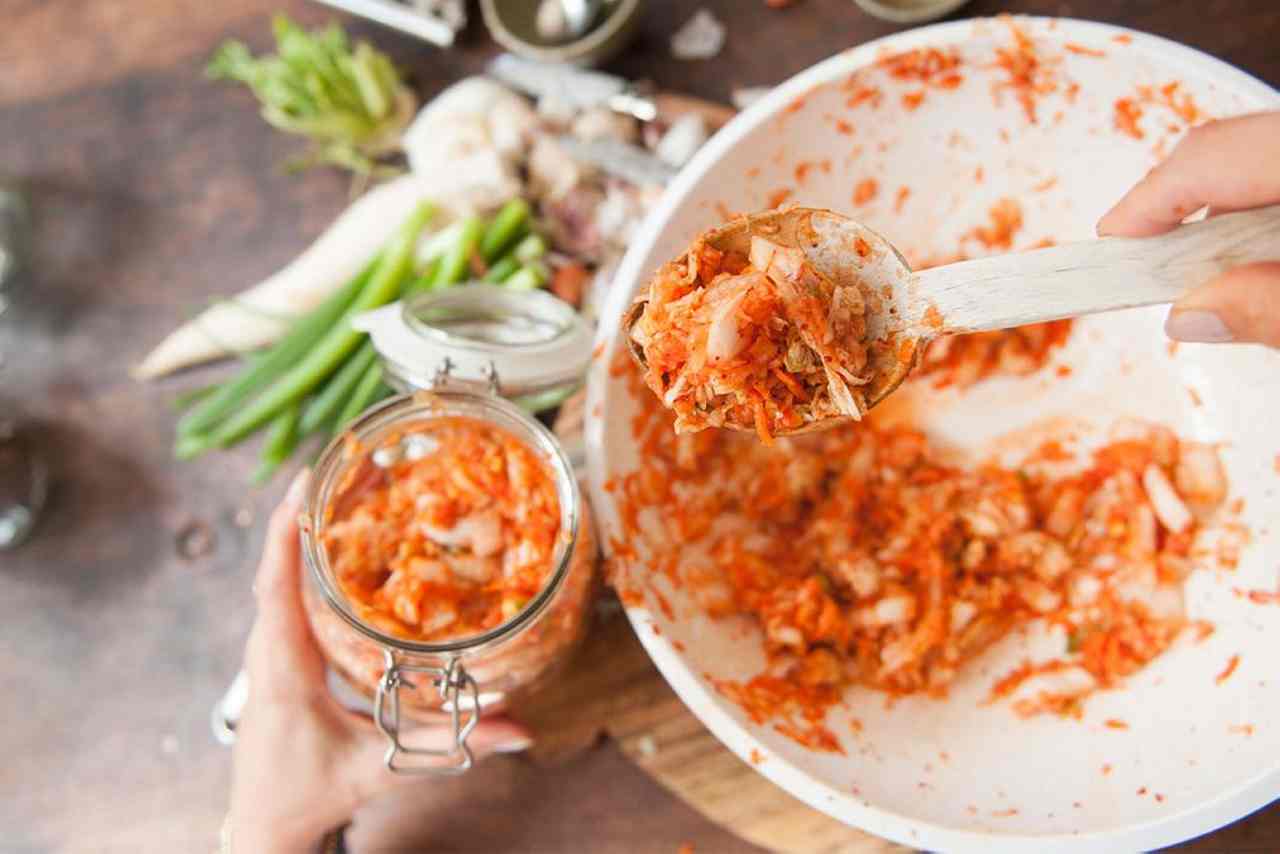Kimchi is a beloved Korean dish that is changing into identified all around the world. Fabricated from fermented greens and flavored with spices, it positive appears wholesome. However ought to discerning diners learn between the strains? First, let’s study what the dish truly is as a result of even some individuals who’ve loved the delicacy could not know what’s inside.
Contents
- What Is Kimchi?
- Well being Advantages of Kimchi
- Well being Dangers of Kimchi
What Is Kimchi?
Kimchi has a really lengthy custom in Korea. "The primary identified information of the dish date from 2,500-3,000 years in the past, when it was merely a preparation of salted greens, made throughout harvest season to forestall meals waste and maintain the household fed in winter," explains Dr. Julia Skinner, founder and director of Root, an Atlanta-based meals historical past and fermentation firm. "As time went on and extra meals had been launched, the dish’s ingredient listing expanded, to incorporate completely different spices and a wider array of greens and aromatics."
The first ingredient in kimchi is cabbage, however it may be made with different greens like daikon radishes, purple peppers and even the occasional fruit, like apples, says Skinner. She notes that flavoring choices have expanded, from plain salt to fish sauce, and from dried pepper flake to gochujang (purple chili paste). Though these elements give kimchi its preliminary taste, the science behind the dish is what makes it stand out.
"Kimchi is a lacto-fermented meals, which implies that it’s softened and soured by lactobacilli (a genus of anaerobic micro organism that eat the starches within the meals when it’s submerged in brine)," Skinner explains in an e mail. "This provides it its bitter tang in addition to a few of its dietary advantages."
Fermentation was initially developed to protect perishable merchandise, like fruits and veggies. Fashionable refrigeration has largely negated the necessity for that objective, however different advantages of fermentation (it permits for the expansion of gut-beneficial microorganisms) maintain the observe alive.
Though fermentation sounds sophisticated, it is truly simply finished from even a house kitchen. Step one within the course of is brining, often known as salting. This attracts the water out from the elements, and takes 12 to fifteen hours. It additionally helps the flavour of the seasonings penetrate. The concoction is then rinsed, drained and saved at round 50 levels Fahrenheit (10 levels Celsius). Numerous wholesome micro organism are identified to spring forth from this methodology, together with L. mesenteroides, S. faecalis, Lb. brevis, Lb. plantarum and P. cerevisiae.
Fermentation is not a one-size-fits-all scenario, as kimchi’s course of is spontaneous, whereas a tradition is added to cheese and yogurt. "The microbes that do the fermenting stay on the floor of the greens used to make the kimchi. This additionally implies that every fermentation and every microbial neighborhood might be considerably completely different from batch to batch," says Bob Hutkins, meals science professor on the College of Nebraska and writer of the second version of "Microbiology and Expertise of Fermented Meals."
Well being Advantages of Kimchi
Calorie-conscious individuals are prone to fall head over heels for kimchi, because the dish could be very low in energy and fats. It additionally boasts a formidable nutrient profile, wealthy in fiber, nutritional vitamins and minerals. Present proof signifies that kimchi is efficient at avoiding most cancers, weight problems and constipation, and decreasing ldl cholesterol. It’s also filled with health-improving antioxidants and anti-aging properties.
A number of that is because of the aforementioned microbes. "If you eat kimchi, you’re additionally consuming billions of those microbes, and these microbes are thought to contribute to extra well being advantages as soon as they attain the gastrointestinal tract," Hutkins says. "For instance, kimchi microbes have been reported to have anti-inflammatory and antimicrobial results."
Nonetheless, customers should not equate kimchi to probiotics, he cautions. "The latter are outlined as microbes having a identified well being profit, which, by implication, means the precise microbe has been characterised and utilized in a scientific research," Hutkins says. "Thus, whereas lots of the kimchi micro organism are very carefully associated to identified probiotic strains, kimchi can’t be thought of the identical as probiotic."
Well being Dangers of Kimchi
Kimchi just isn’t the best choice for folks with a number of food-related points. First, it incorporates fairly a little bit of salt, so folks susceptible to hypertension, stroke or coronary heart illness ought to in all probability steer clear. (A every day serving of kimchi has 1,232 mg of sodium. The World Well being Group recommends folks eat not more than 2,000 mg of sodium per day).
Many kimchi recipes additionally include a major quantity of garlic, which might trigger undesirable reactions in folks with irritable bowel syndrome (IBS). "It’s because garlic incorporates FODMAPs (Fermentable Oligosaccharides, Disaccharides, Monosaccharides and Polyols)," says Sophie Bibbs, IBS and low FODMAP vitamin coach, in an e mail. "Difficult title, however these are principally all sugars that are not correctly absorbed by the intestine, triggering signs equivalent to bloating, constipation, diarrhea and gasoline in folks with IBS. They’re present in all kinds of meals, however are in a really excessive focus in garlic, so kimchi could be very aggravating."
Essentially the most critical kimchi-related concern, nevertheless, is most probably to strike individuals who eat a considerable amount of the dish, not unusual in Korea, the place kimchi is commonly served atop steamed white rice every day. Actually, 20 % of Korean sodium consumption is attributed to kimchi, and research have linked excessive consumption of kimchi with an elevated danger of gastric most cancers, probably the most generally identified kind within the nation. The priority is so actual that specialists are urging warning and moderation with this conventional dish. "Public well being officers in Korea have been advocating for decreasing salty meals consumption. Given how necessary kimchi is to the tradition, one technique is just to scale back the quantity of salt in kimchi," Hutkins says.
Luckily for the occasional kimchi eater, this scary chance is extremely unlikely, Hutkins explains. "In Korea, the place kimchi is a staple and is eaten two to a few per day, common every day consumption in Korea is round 100 grams, far more than within the U.S. So the danger for the traditional shopper could be negligible, and much out-weighed by the advantages."
If you happen to go for store-bought kimchi, there are a few caveats to notice, Hutkins says. First, some recipes embrace bone broth, which may very well be an issue for those who’re vegetarian or vegan. Additionally, you won’t get what you are on the lookout for with the store-bought selection. "Some manufacturers are heat-treated for shelf-life causes, so the microbes are inactivated," he explains, noting that there are lively choices to select from. "One option to inform – if the product is on the shelf at room temperature it has been heated."
That final bit of information could immediate you to make it your self. If that’s the case, why not attempt one in every of these kimchi recipes. Likelihood is, you will prefer it!
Now That is Cool
Many Koreans take part in annual kimchi preparation events! Generally known as Gimjang, these occasions are held amongst households, mates and even at large-scale festivals each mid-October to late November. This custom began a few years in the past as a option to retailer up loads of kimchi for the cold-weather months, and continues immediately extra for enjoyable than necessity.
Initially Printed: Jun 20, 2019
.faq {
shade: #707070;
font-size: 1.125rem;
line-height: 1.75;
border-color: #a2d4d3;
}
.faq h3 {
show: flex;
align-items: heart;
font-weight: daring;
shade: #2B2B5C;
font-size: 1.25rem;
margin-bottom: 1.25rem;
}
.faq h3::earlier than {
content material: url(“information:picture/svg+xml,%3Csvg xmlns=’http://www.w3.org/2000/svg’ width=’26’ peak=’26’ viewBox=’0 0 26 26’%3Epercent3Cpath d=’M27.7,8.2H25.1V19.9H8.2v2.6a1.3,1.3,0,0,0,1.3,1.3H23.8L29,29V9.5A1.3,1.3,0,0,0,27.7,8.2ZM22.5,16V4.3A1.3,1.3,0,0,0,21.2,3H4.3A1.3,1.3,0,0,0,3,4.3V22.5l5.2-5.2h13A1.3,1.3,0,0,0,22.5,16Z’ remodel=’translate(-3 -3)’ fill=’%2336a2a0’/%3Epercent3C/svgpercent3E”);
shade: #36A2A0;
width: 26px;
peak: 26px;
margin-right: 12px;
}
.faq h3::after {
content material: ”;
peak: 1px;
background-color: #36A2A0;
flex: 1 1 0%;
margin-left: 12px;
}
.faq h5 {
font-weight: daring;
margin-bottom: 0.75rem;
}
.faq .questionContainer {
margin-bottom: 1.5rem;
}
.faq .questionContainer:last-child {
margin-bottom: 0;
}
Kimchi FAQ
What’s kimchi made from?
Kimchi is made from fermented greens — primarily cabbage, daikon radishes, purple peppers and even the occasional fruit — and flavored with spices.
What does kimchi style like?
Kimchi could be spicy, tangy, salty, and umami funky, all of it depends upon the recipe. All of it tends to be a bit of bit bitter although because it’s naturally fermented.
Is kimchi good or dangerous for you?
Kimchi is superb for you. It is low in energy and fats whereas boasting a formidable listing of vitamins, fiber, nutritional vitamins, and minerals. Kimchi is efficient at decreasing ldl cholesterol and bettering intestine well being. It’s also filled with antioxidants and anti-aging properties.
Are you able to eat kimchi instantly?
You’ll be able to technically eat kimchi inside a day of creating it — known as fast kimchi. Nonetheless, the flavour develops and deepens over time. A standard size of time for kimchi to ferment appears to be round 7 to 10 days, however style it on daily basis to see what the optimum time is to your style buds. Some Koreans are identified to ferment their kimchi in a crock partially buried within the floor for a number of months.
Does kimchi increase the immune system?
Kimchi has large advantages for intestine well being, which can carry over to your immune system. When your intestine is in fine condition, your immune system is best in a position to operate optimally, so in that sense repeatedly consuming kimchi could help immune system well being.
Is it OK to eat kimchi on a regular basis?
Consuming kimchi every day has large well being advantages. The one disadvantage of kimchi is that it is fairly excessive in sodium and garlic, which will not be appropriate (at the very least not on daily basis) for these with IBS or folks susceptible to hypertension, stroke, or coronary heart illness.







